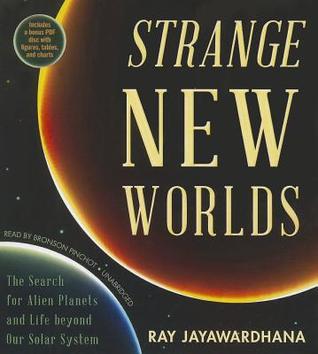Review of Strange New Worlds: The Search for Alien Planets and Life Beyond Our Solar System (audiobook edition) by Ray Jayawardhana, Narrated by Bronson Pinchot
I was excited going into Strange New Worlds. I’m a sucker for astronomy, but I don’t keep up with it as much as I should, so I was looking forward to getting to hear about the new techniques and results in the field. Especially as relate to exoplanets and alien life, something I’ve been acutely interested in since I started working on a science fiction RPG.
I got what I asked for, and I wish I hadn’t.
The book, to its credit, does a good job of covering the entire field, from the first tentative steps to the newest techniques, including near-future techniques that are currently under development. The problem is that the author doesn’t seem to see fit to delve into any depth or engage in a single bit of speculation. Prime opportunities to fire the imagination with ideas of what the distant worlds could be like are instead replaced with a monotonous drone of: “Person Z, at institution W, used technique X to examine planet Y.” Over and over again. Evocative language is ignored, the author instead choosing to name-check and move on. It becomes history without a real sense of narrative, and as a result is as dry as a rock on Mercury.
There is also an issue of at least a few women being dismissed as merely “helping” their husbands or brothers without discussing the women’s unique contributions to field. It feels very dismissive of what they contributed, but there are at least a few modern female astronomers who are given more time on the page. Still, it feels like the author just accepted a very male-centric narrative of the field. I would have liked to see some more digging and more women given the credit I’m sure they deserve. Or at least proper credit given to the historical women already mentioned in the book, instead of lumping their achievements in with that of their male relations.
The narration of the book didn’t help with the monotonous narrative problem, either. Pinchot tries gamely to inject some emotion into this flat timeline of events, but when there’s no real excitement to be found in the text, there’s only so much a reader can do. The end result is like a college professor who thinks he’s a good dynamic speaker because he’s using a few techniques he read about in a book. He only gets about halfway to giving the text any life, and the emotion that is added is as robotic as Data without Brent Spiner. Meanwhile I was sitting in the stands, wondering if I was trapped in purgatory and if the book was ever going to finish. No mean feat, given that the runtime is relatively short in the audiobook world, clocking in at under seven hours.
All of that said, this book could be a lot worse. It’s an effective overview of the history of the field, and covers everything from the oldest of techniques to the modern day. It does a good job tying in historical discoveries and incidents with modern developments, showing how sometimes a thinker from a couple hundred years ago was very, very close to discovering something and only lacked a critical piece of technology or insight to do it. There’s even some interesting tidbits about exobiology, like the color of the star of a world affecting the likely color of the plants on that world.
In the end, I think this is a good book for an academic student of the field. It gives, essentially, a list of the key discoveries in the field, which could be an effective jumping off point for further, deeper research. But as a casual student of astronomy, it left me cold, mostly due to its presentation. Which is a shame, because there’s some interesting stuff here. It’s just all buried under a foot of dust.
Score: 2.5/5
Purchase links:
Text: Indiebound, Kobo, Barnes and Noble, Amazon
Audio: Downpour, Audible, Indiebound
And, as always, remember to check your local library for a copy!

Comments are closed.